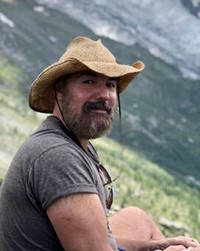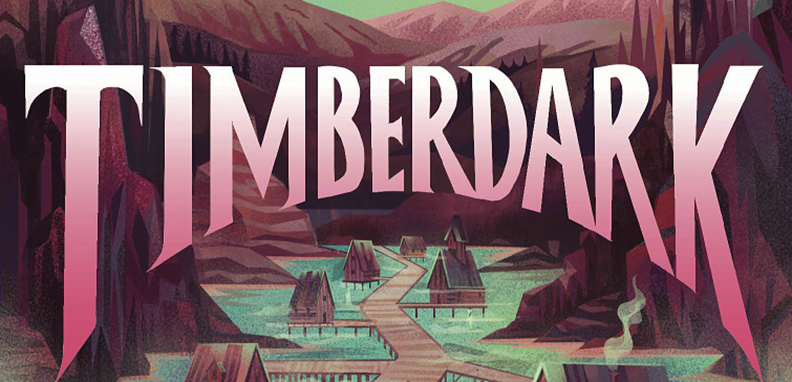Darren Charlton


About Author
Darren Charlton's lifetime obsessions with the National Parks of America, horror, film music and 80s kids movies have all worked their way into his writing - Wranglestone and its sequel, Timberdark. He lives in London with his partner and works in the voluntary sector for a homeless organisation.
@DarrenRCharlton #Wranglestone
Interview
Timberdark (Stripes Publishing)
September 2022
Timberdark takes us back to the wide landscapes of Wranglestone and to a world where the Dead now coexist with the living. But as people strive to return to the 'normal' of 'before', there is a dark secret lurking beneath their new-found freedoms.
In this Q&A, author Darren Charlton tells us how US national parks helped inspire his novels; what stands out about the gay love story in Wranglestone; and why he chose zombies to explore the questions at the heart of these stories.
Read a Chapter from Wranglestone
Read a Chapter from Timberdark

Q&A with Darren Charlton
1. What inspired your debut, Wranglestone, and were you happy with how the book was received - especially as it was published at the start of Covid?
Oh, many things. Firstly, my love affair with America's national parks got me writing in the first place and I wanted to build a story set around them. I also felt strongly that I wanted to write a love story between two boys without the usual coming-out and bullying tropes. Not because that's not most LGBTQ+ people's experience, but because it shouldn't be. I worry that the act of coming out has become mythologised as some rite of passage, when in fact it's an act of seeking permission and approval from the rest of the world because we know we're different. I wanted to give readers, something else. Beyond that, Wranglestone was written right bang in the middle of the Brexit referendum. Does an island community living under threat of being invaded by apparent monsters, ring any bells?
I think the book's reception was a slow-burn even before Covid hit one month later. I wasn't very happy for the book to be marketed as a horror novel, not just because at heart it's a dystopian adventure, but because Wranglestone was also offering a love story between two boys inside genre. That was rare and in store, readers had little way of knowing that. The joy is that readers got the book once it got out there. People really took to Peter & Cooper and that helped give confidence to repackage the book in a way that showcased them. I'm incredibly proud of how prominent the boys are on the cover of Timberdark. Progress in society is not so far along that we can dispense with representation. It really matters!
2. What happens in Wranglestone? How would you describe the book?
The surviving population of America have escaped a zombie apocalypse by escaping to the National Parks. Wranglestone is a cluster of little islands on a lake. In winter the community is placed at great risk from the Dead when the water freezes over. Our protagonists, Peter and Cooper, venture onto the mainland to prepare for winter but following a terrible accident, come to realise that the monsters they've grown up fearing aren't all they've been made out to be. So, for me, it's a dystopian novel dressed in a Wilderness Adventure's clothing with licks of romance, who-dunnit, horror and the Western.
3. Can you tell us a little about Timberdark, the sequel to Wranglestone? Was it a challenging novel to write?
It was immensely challenging. People have expectations of a sequel. There are things they might want more of when I knew I had no interest in writing the same book twice. So, we'll see how that goes. But if you're on board with the change in direction Wranglestone takes half way through, then this carries directly on.
Peter and Cooper are made aware of a relocation plan that takes them out of the parks into a town. This brings its own set of challenges. But there's also the question of why the zombie apocalypse happened in the first place and what, exactly, The Returnee's role in all this, is. Those questions are answered. But the story is kicked started by the arrival of a word - Timberdark and what, where or who that is, and why Cooper knows something about it when Peter doesn't.
4. What was it like returning to the setting and your characters for the sequel?
I loved spending more time on Wranglestone and with the boys. They've been my life for the best part of the last six or seven years, given that the first book was written over three years whilst working full time. And I'll miss them. But I've done everything I can and wanted to do with this story. It's time to let them go.
5. What challenges do Peter and Cooper face in their relationship as their lives start to change? Why do you make their relationship so central to these books?
Well, in terms of the love story, if Wranglestone is about falling in love. Timberdark is about life after Happy Ever After. As a writer, that's a rich space to spend time in. Is the person you fell in love with who you thought they were or something you projected? I'm exploring all that stuff through the prism of genre and the changes Cooper has undergone and how those impact on Peter.
As for why I focused on them, well, in most books, the romance is subplot. I wanted to integrate the plot into the boy's relationship so that one gives rise to another. But also, when I realised that I might be better at writing about love than I first thought, I knew I had a chance of giving a love story between two boys outside the staple of rom-com and contemporary fiction. So, I ran with it.
6. Why did you decide that the Dead, or zombies, would be a good vehicle for the critical social commentary in the books?
Because smuggling social allegory inside genre is a better commercial prospect for publishers and, frankly, because I want people to read my books. Importantly, genre also allows a book to last outside the times in which they were written.
But the Dead made a great trojan horse, first to hide the idea that inside every group society label as monsters, is a human story, and then in Timberdark, a helpful way of showing all the concerns I have about life and the structures we have to live by. One definition of zombie is that it's a person who acts without thinking or does not notice what is happening. That definition speaks directly to the heart of Timberdark.
7. Given the ideas you're exploring, what kinds of questions would you like your readers to ask about their lives, after reading Timberdark?
The great thing about writing teenage characters, especially in dystopian fiction, is that they're about to question the life they've been born into. So, that's all I'd encourage. Don't just inherit the way things are done. Look at them and pay attention to whether those things are right and healthy for you. But LGBTQ+ people know and do this already. And that's a great gift you can make use of in other areas in your life.
8. If there was one change you could make in society to address some of its problems, what would it be?
Oh crikey. Well, I think the pandemic has proven that capitalism is a terrifyingly fragile structure to build society on. But what can you do? Start all over again, probably. I mean, who came up with this sh*t?
9. Your books are very filmic - do you watch a lot of films? Any recent - or zombie - favourites you could recommend?
Tons. This is probably shameful to admit, but my childhood was all about cinema much more than it was books. They occupied my dreams. Even though my degree was in English Literature, my final year dissertation was about film music composition. So, yea, it's how I think. Except I love words and the rhythm of them, so it's not like I feel I'm working in the wrong medium.
I loved Nomadland. Power of the Dog was doing something really interesting by taking a look at male sexuality and the gay male gaze but without being under the banner of queer cinema. That felt like progress.
10. What kinds of books do you enjoy reading?
Cormac McCarthy is a bit of a personal hero, as is Annie Proulx. I love non-fiction/travel writing. What Jon Krakauer can't do with mountains isn't worth doing. The Solace of Open Spaces by Gretchen Ehrlich is something I always dip into. She does something where the economy of the prose somehow captures scale and awe. I use those books to help me in my own writing. I fail most of the time. But trying to conjure feelings about the natural world in a phrase, gives me a great amount of pleasure.
11. Where and when do you get your best writing done - and what are you writing currently?
In a dark room with my ear plugs in first thing in the morning before the world starts knocking.
I don't have any future plans. I'm back to writing for pleasure again and that that's where the joy is. If it becomes something worth sharing, we'll see.
12. What are your favourite ways to spend a lazy day?
Walking. Hiking. Binge watching old episodes of The Golden Girls with rhubarb gin and a tube of Pringles.
 Timberdark
Timberdark
 Wranglestone
Wranglestone
